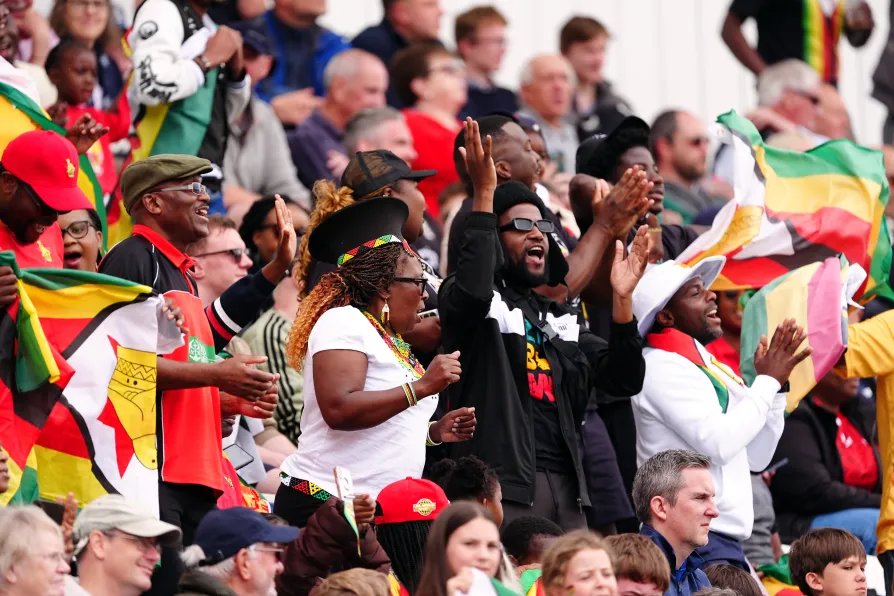
 Zimbabwe fans in the stands on day three of the Rothesay International test match at Trent Bridge, Nottingham, May 24, 2025
Zimbabwe fans in the stands on day three of the Rothesay International test match at Trent Bridge, Nottingham, May 24, 2025
AT THE end of May this year, at least for three days, familiar red, green, black and yellow flags fluttered among a sea of supporters — the colours of Zimbabwe’s national flag. After 22 long years, Zimbabwe was finally playing a Test match against England. The two last played a Test match in 2003.
Away from the sports, in the decade after the millennium, the political relationship between the two countries was strained as Britain gazetted economic sanctions, most since eased, on Zimbabwe on allegations of human rights abuses.
Since then, many developments have occurred in Zimbabwe, both progressive and retrogressive. With the economic challenges in the southern African country as major companies exit the country, even now, citizens have been looking for opportunity elsewhere.
As the gates opened at the Trent bridge in Nottingham, the venue for this historic Test match, something astonishing was visible: the numbers of Zimbabweans who came to support their team — the Chevrons. As the match opened for the four-day test match, England fans were glued supporting the boys in white and red. But while the on-field return was significant, it was the crowd that told the real story, an unfolding tale of identity, exile, and unexpected community.
Thousands of Zimbabweans descended on the Trent Bridge, not just to watch the match, but to find pieces of home in a foreign land. Many had not seen each other in years, yet they found themselves together, laughing, sharing food, and reminiscing, far from Harare, Bulawayo or Gweru.
In 2003, when the last test match was played between the two countries, there were few Zimbabweans in the UK, a sharp contrast to the crowds of 2025. This increase was noted by many bays Zimbabweans occupied. Zimbabweans who spoke to the Morning Star shared their experiences, on how the deteriorating economic situation and lack of opportunities forced them into migrating to the UK.
“Honestly, I don’t even follow cricket,” admitted Tatenda Chaparura, 38, now living in Leeds. “But when I heard Zimbabwe was playing again in a Test here, I knew I had to come. This is about more than sport, it’s about showing up for your country, even when your country couldn’t always show up for you.”
Chaparura came to Britain in 2022 under the health and care visa scheme. Like thousands of Zimbabweans, he left behind a country whose economic woes have driven countless professionals, students, and families to seek better opportunities abroad.
According to UK migration figures, at least 30,000 Zimbabweans have moved to the UK in the last four years, a staggering number for a small southern African country.
The crowd at Trent Bridge was a reflection of that reality. Entire sections of the stands were occupied by Zimbabwean families. Some wore cricket jerseys, others the Zimbabwean flag draped across their shoulders, and others in full attire of Zimbabwean colours, showing their roots in community fellowships that have sprouted across cities like Birmingham, Manchester, Luton and Leicester.
“I came for the vibe,” said Nomsa Dube, 27, who moved to Leicester in 2021 to study her masters course. “I didn’t even know the rules of cricket, but seeing so many of our people here? It made me proud. For once, we weren’t just a statistic, we were visible, united.”
The sense of pride and unity was palpable. During the match and breaks in play, impromptu sing-alongs erupted in the stands. Food stalls offering various cuisines saw long queues. It felt more like a festival than a cricket match. Yet behind the joy was a common understanding, many who were cheering had left Zimbabwe under duress.
In their first innings, Zimbabwe reached the relative comfort of 187-3 on a flat pitch after being dominated by England’s batsmen. Because injured paceman Richard Ngarava was unable to bat, Zimbabwe’s innings ended when they were nine wickets behind. England won by 45 runs and an innings.










